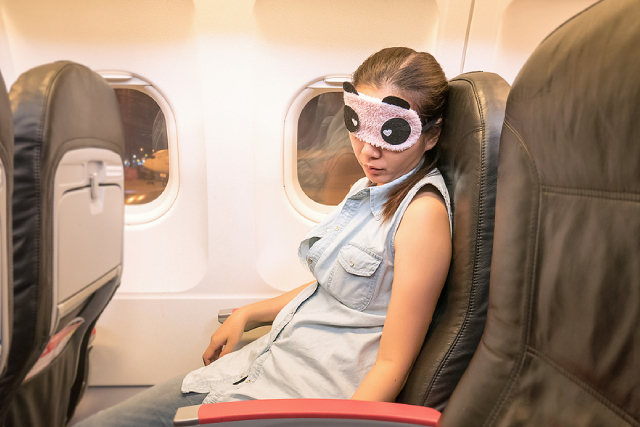 Imagine this: you’ve been counting the days left until your big trip, and once you’re on the plane, your excitement about what awaits on the other side of the world keeps you from sitting still throughout the entire flight. Upon landing, you rush out and begin your plans, be it to explore the sights, try out the local cuisine, or more. But despite finally getting what you wanted, you feel something off with yourself. Your coordination isn’t what it used to be and concentrating is harder to do. You’re feeling cranky, exhausted, and generally don’t feel good. During the day, when you’re supposed to be out and about, you’re having trouble staying awake. And at night, dozing off just doesn’t seem to be possible matter what. This is called jet lag. Although it may be a temporary issue, it is recognised as a sleeping disorder.
Imagine this: you’ve been counting the days left until your big trip, and once you’re on the plane, your excitement about what awaits on the other side of the world keeps you from sitting still throughout the entire flight. Upon landing, you rush out and begin your plans, be it to explore the sights, try out the local cuisine, or more. But despite finally getting what you wanted, you feel something off with yourself. Your coordination isn’t what it used to be and concentrating is harder to do. You’re feeling cranky, exhausted, and generally don’t feel good. During the day, when you’re supposed to be out and about, you’re having trouble staying awake. And at night, dozing off just doesn’t seem to be possible matter what. This is called jet lag. Although it may be a temporary issue, it is recognised as a sleeping disorder.
What happens to your body under jet lag
Jet lag occurs because travelling tricks the body’s internal clock. This clock, also known as the circadian rhythm, tells the body when to stay awake and when to sleep. It is essentially is a short-term sleep issue that affects those who travel over several time zones in a short amount of time.
For instance, if you arrive somewhere with a different time zone and it’s daytime while you left home at nighttime, your body will be confused into thinking it’s still time to sleep, and you could experience jet lag. Generally, the onset of symptoms happens if you travel at least two time zones.
Symptoms of jet lag
If you have jet lag, you may experience several of the following symptoms:
- Mood swings
- Fatigue
- Disturbed sleep or bad sleep quality
- A general feeling of being unwell
- Difficulties in concentrating or functioning normally
- Diarrhea or constipation
Thankfully, jet lag goes away on its own after a while, typically lasting a day or so until you acclimate to the local time zone.
How to avoid getting jet lag
Although jet lag can’t be entirely prevented, there are ways to minimise its effects. Keep these tips in mind before your next big trip:
1. Time your flight
Look for flights where your destination’s local time is close to when you usually wake up. Most flights crossing several time zones typically arrive in the morning. Thus, you may have to set off from home at odd hours. In short, your arrival time is key if you’re looking to minimise the symptoms of jet lag as much as possible.
2. Sleep on the plane
Ideally, you’d wake up upon arriving in the morning. If necessary, you can take a sleeping aid but don’t rely on it once you arrive. If you can’t seem to fall asleep during the flight, try to stay active by walking around and stretching your limbs regularly.
3. Don’t stay inside when it’s daytime at your destination
When it’s daytime at your destination, be active and get as much light as possible in the morning and afternoon to let your internal clock adjust. While you may not be hungry upon arrival, try to eat something at the usual times you have a meal and avoid overeating. Doing so also helps in adjusting your body clock.
4. Avoid quick stopovers in extra time zones if possible
Stopovers can further confuse your body clock since there is not much time to fully adjust. Hence, it’s best to book a straight flight or choose a schedule with just enough time to switch to another plane.
5. Adjust your light exposure before the trip to reduce the duration of your jet lag
Controlling your light and darkness exposure before travelling can help manipulate your internal clock and quickly ease it into the new time zone. This is done by calculating the best schedule adjustment for you and your travel plans. If you need help, an app called Entrain makes it easier to follow through with your schedule adjustment.
Conclusion
Jet lag is a minor yet disruptive issue that could lead to your plans falling apart if you don’t know how to handle it. But as we have covered above, the best prescription for jet lag is to always set off unfrazzled and take measures to minimise the symptoms before and after you land.
If you’re going on a trip soon, jet lag is only one part of your well-being that you should plan for. Given how emergencies can arise anytime while you’re abroad, it’s recommended to arrange for EMA Global’s medical evacuation and medical assistance services so that you can rest assured that you will receive the necessary resources to stay safe, especially if you’re on a solo trip.

